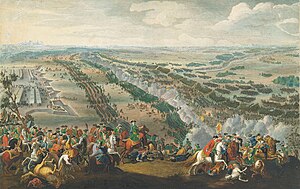Swedish invasion of Russia
| The Invasion of Russia by Charles XII | |||||||
|---|---|---|---|---|---|---|---|
| Part of Great Northern War | |||||||
 The Battle of Poltava by Denis Martens the Younger, painted 1726 |
|||||||
|
|||||||
| Belligerents | |||||||
|
|
|
||||||
| Commanders and leaders | |||||||
|
|
|
||||||
| Strength | |||||||
| 192,000 | 97,000 | ||||||
| Casualties and losses | |||||||
|
In major battles: 10,464 killed 15,502 wounded Many thousands froze to death |
In major battles: 5,690 killed 7,367 wounded 15,676 captured 13,759 froze to death |
||||||
Decisive Russian victory
The invasion of Russia by Charles XII of Sweden was a campaign undertaken during the Great Northern War between Sweden and the allied states of Russia, Poland, and Denmark. The invasion began with Charles's crossing of the Vistula on 1 January 1708, and effectively ended with the Swedish defeat in the Battle of Poltava on 8 July 1709, though Charles continued to pose a military threat to Russia for several years while under the protection of the Ottoman Turks.
In the years preceding the invasion of Russia, Charles had inflicted significant defeats on the Danish and Polish forces, and enthroned the puppet king Stanislas Leszczyński in Poland. Having consolidated his victories there, Charles turned his attentions to Russia. He entered Russia by crossing the frozen Vistula River at the head of 40,000 men, approximately half of them cavalry. This tactic was characteristic of his military style, which relied on moving armies with great speed over unexpected terrain. As a consequence of this rapid initiation of the campaign, Charles nearly gave battle with Peter the Great just one month into the campaign, reaching Hrodna, now in Belarus, a mere two hours after Russian forces had abandoned it.
Charles was a skilled military leader, and probably considered the invasion to be a risky enterprise; he had resisted the advice of his generals to invade during the Russian winter following the first Battle of Narva (1700). He chose to continue his invasion now because he expected Swedish reinforcements and the alliance of the Cossacks under Ivan Mazepa. The reinforcing Swedish army, however, was ambushed by Russians, and a Russian army under Aleksandr Danilovich Menshikov had destroyed Mazepa's capital and chased him to Charles with just thirteen hundred men.
...
Wikipedia
